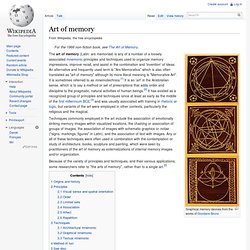

30 Tips to Improve Your Memory. Memory and Forgetting. 5-D optical memory in glass could record the last evidence of civilization. The image shows the digital data recorded into 5D optical data storage.

Credit: University of Southampton Using nanostructured glass, scientists at the University of Southampton have, for the first time, experimentally demonstrated the recording and retrieval processes of five dimensional digital data by femtosecond laser writing. The storage allows unprecedented parameters including 360 TB/disc data capacity, thermal stability up to 1000°C and practically unlimited lifetime. Coined as the 'Superman' memory crystal, as the glass memory has been compared to the "memory crystals" used in the Superman films, the data is recorded via self-assembled nanostructures created in fused quartz, which is able to store vast quantities of data for over a million years. People with highly superior powers of recall also vulnerable to false memories. Explanation: How Brain Training Can Make You Significantly Smarter. Hints for Remembering Better.
4 Things Most People Get Wrong About Memory. Human memory has been shown again and again to be far from perfect.

We overlook big things, forget details, conflate events. One famous experiment even demonstrated that many people asked to watch a video of people playing basketball failed to notice a person wearing a gorilla suit walk right through the middle of the scene. So why does eyewitness testimony continue to hold water in courtrooms? A new nationwide survey of 1,500 U.S. adults shows that many people continue to have the wrong idea about how we remember—and what we forget. Here are four common incorrect assumptions about memory, held by some of the survey subjects, that experts say should be forgotten: 1.
Nearly two thirds (63 percent) of those in the random telephone survey said that they agreed with this model of a passively recorded memory. 2. More than three quarters (77.5 percent) of people thought that this would be the case. 3. How to Memorize Things Quickly. People like to joke that the only thing you really “learn” in school is how to memorize.

As it turns out, that’s not even the case for most of us. If you go around the room and ask a handful of people how to memorize things quickly, most of them will probably tell you repetition. That is so far from the truth, it’s running for office. If you want to memorize something quickly and thoroughly, repetition won’t cut it; however, recalling something will. The problem is that recalling something requires learning, and we all learn in different ways. Before we start, you need to establish something: are you an auditory, visual, or experiential learner? Step 1: Preparation To optimize your memorization session, pay close attention to which environment you choose. Next, start drinking some tea. How to Tap Into Your Memory and Start "Unworrying" Sugar makes you stupid: Study shows high-fructose diet sabotages learning, memory. Attention, college students cramming between midterms and finals: Binging on soda and sweets for as little as six weeks may make you stupid.

A new UCLA rat study is the first to show how a diet steadily high in fructose slows the brain, hampering memory and learning — and how omega-3 fatty acids can counteract the disruption. The peer-reviewed Journal of Physiology publishes the findings in its May 15 edition. "Our findings illustrate that what you eat affects how you think," said Fernando Gomez-Pinilla, a professor of neurosurgery at the David Geffen School of Medicine at UCLA and a professor of integrative biology and physiology in the UCLA College of Letters and Science. "Eating a high-fructose diet over the long term alters your brain's ability to learn and remember information. But adding omega-3 fatty acids to your meals can help minimize the damage. " Secrets of a Mind-Gamer. 10 ways to improve your observation skills (and your career), part III.
How did you do on the observation test?

If you found your observation skills lacking, it may be something to consider working on, as… For people who plan to become the leaders of tomorrow, developing a keen sense of observation is a must. Art of memory. The art of memory (Latin: ars memoriae) is any of a number of a loosely associated mnemonic principles and techniques used to organize memory impressions, improve recall, and assist in the combination and 'invention' of ideas.

An alternative and frequently used term is "Ars Memorativa" which is also often translated as "art of memory" although its more literal meaning is "Memorative Art". It is sometimes referred to as mnemotechnics.[1] It is an 'art' in the Aristotelian sense, which is to say a method or set of prescriptions that adds order and discipline to the pragmatic, natural activities of human beings.[2] It has existed as a recognized group of principles and techniques since at least as early as the middle of the first millennium BCE,[3] and was usually associated with training in rhetoric or logic, but variants of the art were employed in other contexts, particularly the religious and the magical.